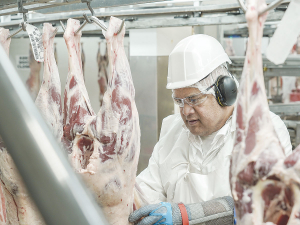Sector agreement could ease labour shortage
The Meat Industry Association (MIA) claims a new sector agreement could be vital in addressing the significant labour shortages in New Zealand’s meat processing sector.
 Meat sector unions are concerned by a new sector agreement which will see migrant workers paid beneath the median wage.
Meat sector unions are concerned by a new sector agreement which will see migrant workers paid beneath the median wage.
Meat sector unions are crying foul over a plan to pay migrant workers less than the median work for short stints in processing plants.
The 'sector agreement' unveiled by the Government will allow 300 migrants to work for $24/hour for seven months, the wage threshold will be updated each year to reflect changes in the median wage to maintain its relative value.
New Zealand Meat Workers Union general secretary Daryl Carran says, while he welcomes extra workers for the labour-strapped meat processing sector, he disagrees with the low wages on offer.
Carran says meat company profits are rising dramatically and they can afford to pay migrant workers way more than $24/hour.
"Despite rising shipping costs, meat processors are doing very well. Global prices are strong and profit per unit of cattle, lamb and mutton remain very high," he told Rural News.
"We believe there's no justification for paying migrant workers $24/hour.
"Profits for meat companies have risen drastically and there's no need to pay migrant workers below the median wage."
The meat processing sector employs between 18,000 to 23,000 workers at peak season but face a shortfall of about 5,000 workers. Most workers are paid between $18 to $30/hour.
Carran says he hasn't received full details of the agreement but hopes that pastoral care of migrant workers is enshrined in the deal.
He says the meat processing sector should not follow down the path of the horticulture sector, where some employers have been accused of exploiting Pacific Island workers.
FIRST Union, which represent workers at plants supplying supermarkets and retailers, says it wasn't consulted. Union general secretary Dennis Maga says the agreement will undermine wages and conditions in key sectors and would have never been agreed to if actual consultation had taken place.
"We represent workers in three of the five industries for which sector agreements have been announced but there has been no consultation with us whatsoever," he told Rural News.
"Given the lack of consultation on this proposal, it's difficult to escape the conclusion that this is a cheap labour stitch-up between the Government and businesses."
However, the Meat Industry Association (MIA), which represents meat processors, says the agreement should go a long way to addressing the significant labour shortages in the meat processing sector.
"Labour shortages have been a significant issue for the meat processing sector for some time, so this agreement is a welcome boost to our own domestic recruitment efforts," says MIA chief executive Sirma Karapeeva.
"Without sufficient employees, processors cannot run plants to the desired capacity, fully process all products and capture the maximum value."
She says this not only deprives processors and farmers of revenue but also rural communities and the New Zealand economy of income.
"Meat processors are predominantly based in the regions so enabling meat processors to operate at their desired capacity will provide additional money to the communities where they are located."
Two Waikato dairy farmers and Federated Farmers leaders have thrown their hats in the ring for this year's Waikato Regional Council elections.
Buying a farm is challenging but still achievable according to research recently carried out by Smaller Milk and Supply Herds (SMASH).
A world-first public-private joint venture helping farmers cut emissions is set to have the first product from its investment portfolio - a methane-reducing bolus - available for beef farmers early next year.
Donald Trump's uncompromising tariff policy is set to put New Zealand dairy exports to the US under huge pressure.
Two large milk processing plants in New Zealand are changing hands.
Sheep and beef farmers are urging the Government to do more to stop productive farmland overrun by pine trees.